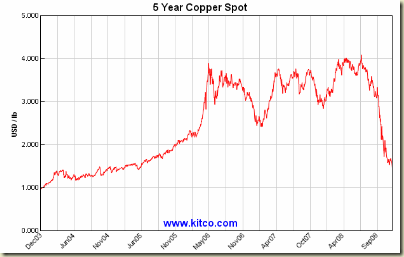 One way for government to effect prices is to intervene in the market by limiting supply. Let me first state that we here do not condone theft or criminal activity of any kind and I should also add that we commend the FBI for the work it has done the past few years under difficult circumstances. That said, in a D-Watch post on November 22, I wrote,
One way for government to effect prices is to intervene in the market by limiting supply. Let me first state that we here do not condone theft or criminal activity of any kind and I should also add that we commend the FBI for the work it has done the past few years under difficult circumstances. That said, in a D-Watch post on November 22, I wrote,
The copper market is a bit healthier than Nickel, though we should remember that copper was in such short supply it was not uncommon to hear stories of copper cable theft. I haven’t heard any of those stories recently.
Today, the FBI released a report titled “Copper Theft Threatens U.S. Infrastructure”. The report is the result of a Congressional push involving new laws regulating copper recyclers and establishing an FBI task force.
Cops copping copper coppers
To illustrate the seriousness of copper theft, the FBI presented the following illustration in its report:
According to open-source reporting, on 4 April 2008, five tornado warning sirens in the Jackson, Mississippi, area did not warn residents of an approaching tornado because copper thieves had stripped the sirens of copper wiring, thus rendering them inoperable.
The FBI’s data appears to be all before the Fall of 2008, so it remains to be seen if we are correct that falling market prices will reduce copper thefts. Hopefully, the FBI has more specific crime data than anecdotal “open source” intelligence which would seem to show a decrease in theft, or at least a decreased interest in reporting it.
I. Anti-theft measures bullish for copper prices
The public should realize that the FBI’s mission is one of safety, not economics, though the two often overlap. The anecdote at the top of this post says all that needs to be said about the dangers of copper theft, though it says little about the economic consequences of anti-theft measures.
A rigorous anti-theft program would actually increase copper prices. Why? The FBI stated, “Organized copper theft rings may increasingly target vacant or foreclosed homes as they are a lucrative source of unattended copper inventory.” Selling unattended inventory back in to the market would obviously increase supply and lower prices, forcing unused copper to sit in unused homes constricts supply and raises prices. Economics 101.
II. Scarce resources
As I stated earlier, copper theft is a serious issue. It can and does threaten public safety. But there is crime and then there is Crime. We should respect law enforcement’s role in society to keep us safe, but we should not abuse law enforcement by asking it to mask political-economic failings.
In a world of falling copper demand, it should be logical that copper theft will actually decrease. Market forces exert influence on crimes that are essentially economic, this is different from Crime that occurs due to passion or psychosis. Perhaps the problem now is not as big as it was months ago. If the problem is with vacant and foreclosed homes, the FBI is dealing with economic crime not physical crime. In an era where events like the Mumbai terrorist attacks serve to remind us that we face an ever present threat from violent attack (big-C Crime), should we commit so many valuable law enforcement resources to protecting copper in vacant housing developments? Is this a repeat of Alberto Gonzales’ FBI obscenity squads?
Perhaps Congress should take a look at a market chart before it diverts FBI resources away from many of the other serious threats it has to deal with. (See chart, source Kitco Base Metals).
III. Summary
The FBI writes:
Open-source reporting from February 2007 indicates that the global copper supply tightened due to a landslide at the Freeport-McMoran Copper and Cold mine in Grasberg, Indonesia in October 2003 and a worker’s strike at the El Abra copper mine in Clama, Chile in November 2004. These events contributed to copper production shortfalls and led to an increase in recycling, which in turn created a market for copper.
Laws exist on the books to apprehend and severely punish thieves and their conspirators who commit Crime that would cause a public danger (such as stealing from emergency warning systems). Since it seems that we are back within pennies of the November 2004 prices, the price point cited that “created a market for copper”, and the future for theft is confined to “vacant or foreclosed homes”, don’t the economics undermine the argument for copper cops?
. . . And that’s how it goes



